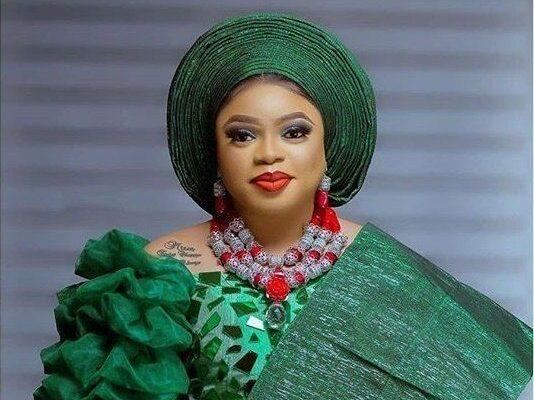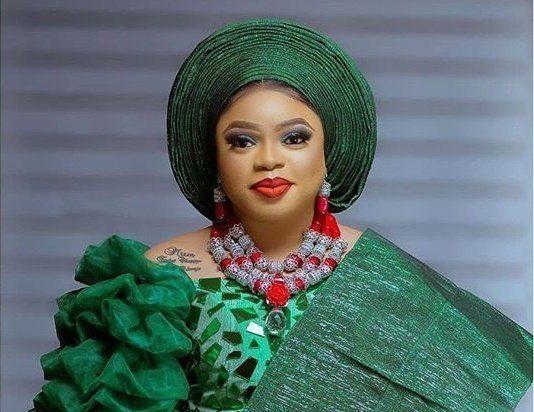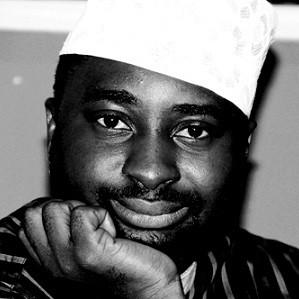
Debating Ideas is a new section that aims to reflect the values and editorial ethos of the African Arguments book series, publishing engaged, often radical, scholarship, original and activist writing from within the African continent and beyond. It will offer debates and engagements, contexts and controversies, and reviews and responses flowing from the African Arguments books.

Born Okuneye Idris Olanrewaju in Lagos, Nigeria, Bobrisky is arguably Nigeria’s most contentious person, a trans personality famed for her unconventional life. Her influential presence on social media and on Nigerian streets makes a strong case for the normalisation of queerness in Nigeria. Bobrisky’s rise as a public figure is wrapped in layers of contradictions: a dark-skinned, assigned male at birth (AMAB) person who thrived in the business of bleaching cream, to supposedly being homosexual, which she denies and condemns – to evolving from cross-dressing to a trans personality. Bobrisky’s engagement with the political utility of hypocrisy and her crass transactions in the cultural currency of contradictions are intentionally or unintentionally used to disrupt Nigeria’s interpretation of dress, gender and identity in “a patriarchal culture disturbed by profound anxieties and contradictions” (Cressy).[1] Her contradictions are not accidental but intentional, and they include unorthodox methodologies used to self-serve.
The parallel between Bobrisky’s contradictory life to Nigeria’s bundle of inconsistencies and two-facedness is striking. Nigerian society is riddled with blatant illogicalities. For instance, Nigeria enacted the law that sends homosexuals to jail for 14 years, yet Nigerians are one of the highest consumers of homosexual porn according to Gay Star News.[2] Nigerians are some of the most religious people in the world, but their diabolic politicians buy salvation through tithing from equally predatory pastors. Nigeria is one of the richest countries in Africa, yet more than 40 percent of its population live in dismal poverty – the so-called giant of Africa, yet nearly half of its population is unemployed. So, yes, Bobrisky plies the kind of wares they buy: she is hypocritical with a creative twist. Still, Bobrisky, perhaps unintentionally, continues to revolutionize the Nigerian concept of queerness and chips away at the concrete slab of gender normativity in Nigeria.
As indicated in Bobrisky’s interview with Adesuwa Onyenokwe,[3] at the age of 16 she caused a pandemonium the day she walked through the streets of Lagos in flamboyant female attire. This was on a dare, both for financial reward and for the sheer fantasy of displaying her private fascination with femininity in the public space. That legendary outing, for which she was arrested, reinforced her reputation for contradictions. She went to the police cell unashamed of her identity. In taking that walk, she both presented herself as an individual sensitive to the Nigerian culture of paradoxes and hypocrisy and constructed for herself a persuasive identity as a trans woman by acting out her feelings in public. Similarly, at another occasion, she talked about being pregnant and relished the joys of hopeful motherhood.
Bobrisky is an online and offline warrior, fighting gender conformists, including homophobes, and always emerging victorious. One of such anti-queer persons is Olusegun Runsewe,[4] a director general for Nigeria’s National Council of Arts and Culture. He calls Bobrisky disgusting, a disgrace and a nuisance to the values of African culture. On his reasons to have crashed Bobrisky’s 28th birthday party to get her arrested, he says, “Do you know that the so-called Bobrisky was going to set up the African Chapter of Gay and LGBT or whatever they call it in Nigeria during his … aborted birthday party? People from over 70 countries arrived in Lagos for the event. They were … preparing to launch it. We got a hint of it and had to put a stop to the event…. If they had launched that thing, Nigeria would have been destroyed by now.” Runsewe has not been able to arrest or harm Bobrisky as he threatens. Bobrisky has continuously told him that she is strong as a rock and that he can’t harm her because she knows his bosses and they protect her.
Bobrisky is not just a celebrity but also a keen entrepreneur. The success of her bleaching cream business, which has expanded to include body shower gels, body scrub, knuckle cream and face soap, revealed her business acumen early on. While in college, her commercial skills ranged from teaching dance classes, to selling items like watches and make-up. Each of her products sell for as much as 250 dollars and she has more than a dozen customers a week.
Further, Bobrisky is tirelessly documenting her trans life through the agency of social media. Between October and November 2016, she was the most searched Nigerian on the internet. Today, she has over 3.7 million followers on Instagram. Perhaps, she trends because she claims to have a mystery “bae”, who she says is one of the richest men in Africa. In her Instagram, she purportedly reveals the identify of her mystery “bae” when she shared this: “The wait is OVER !!![5] I’m not d type of person that like bring my relationship here … but sometimes decision change. And I remember asking for ur permission to do dis … you asked me to go ahead. Thanks for everything you do…. Have fought so bad for true love boom you cam into d picture. I love u @henryike.” Bobrisky uses social media to promote her business and queer brand. Social media has proven to be a potent tool for her. She has used it to penetrate the Nigerian institutions of politics and religion in her inadvertent attempt to make a convincing case against the oppression of queer people in the country.
Institutions and people who perpetrate hate and violence against queer people in Nigeria derive their motivation and protection from the country’s heteronormative laws. Olusegun Runsewe[6] is one of such. He believes that conformism is all it takes to contain non-conformists like Bobrisky. But the full measure of Bobrisky’s life – her aversion to hostility, her rejection of a diminishing self – has shown us that it is possible to be different, queer, proud, and unapologetic about one’s existence.
To find an individual who is capable of destabilising stereotypes such as Bobrisky is to locate someone who has chosen to retell the queer story as one of constant human reinvention in a much-maligned universe. Bobrisky’s journey, from a hybridity of identity to a bold stance that echoes the pioneer evolution of Côte d’Ivoire’s Woubi cross-dressers/transgenders to one of certainty about who she is and is not, affirms the human ideal of self-rebirth. Transgender people are even more invisible, probably because of the binary narrative that the largely ignorant homophobic world of heterosexuality in Nigeria sees the queer world as comprising mainly of homosexuals. It is pitiable; yet here is Bobrisky defying those perceptions by creating visibility for herself and the queer community in Nigeria.
Nevertheless, she is not welcomed by everybody. The fact that she believes that light skin complexion is better than dark skin complexion, which is why she started producing bleaching creams and bleached her dark skin to a lighter complexion, is condemned. Her rejection of her dark complexion remains consistent with the contradiction she bears. She defiantly lives out her gender preference, but rejects her dark complexion. In rejecting her dark complexion, she ironically embraces the heteronormative standards of beauty. Some critics, even in the queer community, assert that Bobrisky exploits the trans image to sell her brand. Bisi Alimi,[7] a Nigerian LGBT rights activist, calls her a fraud. Perchance, this is because of her approach to materialism and money, which threatens the lives of other trans women in Nigeria who neither have the means, nor the money to brand themselves. Noni Salma,[8] a Nigerian transwoman finds Bobrisky’s tactless slant distasteful and says that, “It’s just so confusing and frustrating … for so many people, this is the only perceived image of trans-ness that they know: the ideology that transitioning is done or even ‘chosen’ for a transactional purpose. This is so damaging.” But, to give Bobrisky the benefit of doubt, her condemnation of gay marriage in 2016[9] could be a political posture and her disrespectful comments on women and sex workers reinforce and mirror the patriarchal domination of religious and cultural institutions.
Those who understand her intention or non-intention of normalising queerness in Nigeria and recognise her courage in pursuing this vision will see that society’s persistent emphasis on her faults is a deliberate ploy to bury her truth and erase her achievements. It is for confronting this toxic tradition of hate against queer people by courageously embodying the complex contradictions of her life that Bobrisky is famous.
Conclusion
Many may find Bobrisky’s inclination to flaunt her wealth and social connection in the public domain offensive. I admit the fact of her extravagant life, but it is not surprising given her peculiar situation as a queer person who lives in a capitalist society that regards wealth as a symbol of accomplishment and a criterion for acceptance and inclusion into society’s fraternity of human beings. It is not unexpected that Bobrisky leverages her financial success and social status to blind society’s homophobic gaze and to pave way for herself and for queer people in Nigeria.
It is difficult to speak about Bobrisky without oversimplifying a complex phenomenon. It is even more difficult to attempt to offer a comprehensive analysis of her life, since her reign as the Nigerian queer icon is just beginning. It seems to me, however, that to escape the possibility of misrepresenting her, one ought to accept the peril of speaking so little about a character who has said so much about her private life in the public domain. Bobrisky comes alive in the consequences of the contentions between the conservative elements of patriarchal Nigerian culture and the liberating forces of modernity and in the unification of these conflicting components into a risky whole. Indeed she acts as a mirror through which Nigerians can see themselves: a life of contradiction, brazen display of wealth and the worship of money. Yet, she is a queer messiah who will call forth disciples of queerness.
References
[1] Cressy, David, “Gender Trouble and Cross-Dressing in Early Modern England.” Journal of British Studies. Jan. 10, 2014.
[2] Gay Star News, “And the country that watches the most gay porn is.” GayStarNews.com. Oct. 2018.
[3] Bobrisky, “Adesuwa Onyenokwe Talks to Bobrisky About Bae, Bleaching& Is he Gay.” YouTube, Sept. 2016.
[4] https://www.youtube.com/watch?v=3VVHnCyls2Qhttps://www.youtube.com/watch?v=3VVHnCyls2Q.
[5] Bobrisky, “Bobrisky finally unveils the identity of his “bae” as he shares photos of him.” Lindaikejisblog.com. July 2020.
[7] Alimi, Bisi. “He is a fraud,” Lindaikejisblog.com. December 2020.
[8] Salma, Noni. “He is a fraud,” Comments. Lindaikejisblog.com. December 2020.







He does not mirror Nigeria in any way form, or fashion. Is Unoma one of them?.
This piece peddles the jaded leftist shibboleths that pass for “scholarship” in woke circles. No one takes them seriously in most of the world, Nigeria included.